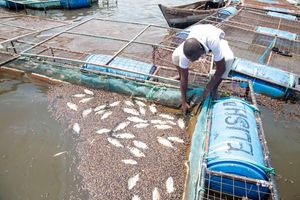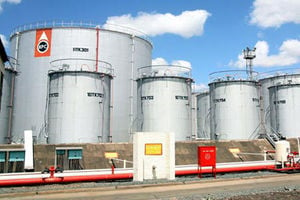
A decade after the Thange oil spill, residents are still paying the price—with their health and livelihoods. William Ngie and Emmanuel Nyamasyo have been diagnosed with acute kidney failure linked to an oil pipeline that leaked an unknown amount of oil in 2015.
Until a year ago, Emmanuel Nyamasyo was one of the young boda boda drivers who travelled in and around Thange Township in Makueni County.
Since then, acute kidney failure has turned his life upside down.
Today, the 30-year-old moves from one hospital to another to manage the blindness and swollen feet that have plagued him since he was diagnosed with diabetes.
"My life depends on a dialysis machine after my kidneys failed," a frail Mr Nyamasyo told Nation.Africa in Ngomano village on Wednesday, fighting back a steady stream of tears.
"I am supposed to undergo dialysis twice a week. However, it is often difficult to access the fare to travel to the hospital because I am not productive."
The first-born in a family of six, she is one of a growing number of local people battling the complications of diabetes and liver disease.
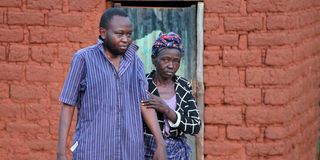
Susan King'oo accompanies her son Emmanuel Nyamasyo, who has been diagnosed with acute kidney failure, during an interview with Nation in Ngomano village, Makueni County, March 20, 2025. Many residents in the area, where an oil pipeline leaked an unknown amount of oil in 2015, are suffering from complications of liver and kidney disease.
Although the number of Thange residents battling diabetes and liver disease is not publicly available, residents told Nation.Africa that at least 100 Thange residents were diagnosed with the two diseases last year, and they insisted that at least 20 succumbed within that period.
"We bury at least three people every week around the Thange oil spill area. This is alarming," Thange/Utithi Ward MP Eric Katumo told the county assembly recently when he asked the Makueni County Assembly's environment committee for a statement on the Thange oil spill.
A 2021 study by Elsie Ng'endo Wambugu of Daystar University on the environmental impact of the Thange oil spill linked the oil spill to reduced productivity of the area's farmlands.
The study found an increase in soil dryness in the polluted region.
But it is the impact of the oil spill on health and water that has kept the outcry going.
The furore over the effects of the unresolved spill intensified last month after residents discovered traces of petrol in shallow wells.
This prompted Mr Katumo to seek an opinion from the Makueni County Assembly's Environment Committee and to write to the Kenya Pipeline Company (KPC) and the National Environment Management Authority (Nema), asking for urgent intervention.
Around the same time, Makueni Senator Daniel Maanzo organised a medical camp in Thange Township, which was swamped by dozens of sick residents.
They complained of dizziness, headaches, severe back pain and swollen feet, which doctors have since linked to kidney and liver disease.
Medical reports link the illnesses to those that experts say are caused by exposure to oil that has spilled into the area from a ruptured pipeline managed by KPC.
It has also contaminated local water sources and the environment.
Although it is not clear when the spill began, it was discovered in 2015 after residents found traces of petrol in shallow wells.
An economic and social impact report prepared by Panafcon Consultants Ltd - a company hired by KPC - spells doom for the region, which was once a horticulture hub.
The report, seen by Nation.Africa, shows that 161 out of 1,071 residents surveyed have contracted diseases caused by benzene and toluene poisoning.
The two are among the elements found in the oil.
Edward Muia, a teacher who was among those who tested positive for benzene and toluene poisoning after KPC screened Thange residents in 2016, has since succumbed to complications related to liver and kidney disease.
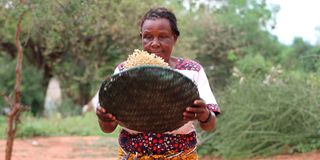
Agnes Kandi winnows maize in Thange village, Makueni County, on March 20, 2025. Her husband, Edward Muia, is among dozens of residents who have succumbed to liver and kidney diseases linked to the oil spill in the area in 2015.
"My husband lost his battle with kidney and liver diseases in September last year, after years of medication. He was one of the first people to test positive for oil poisoning when KPC took samples from some of the Thange residents to South Africa for testing. In his last moments, he told us that oil poisoning had taken him down and that if KPC was considering him for compensation, we should use the money well by investing it in a project that would make us remember him," Agnes Kandi, his widow, told Nation.Africa in an interview.
Paul Kalai, a community health promoter working in the epicentre of the oil spill, is one of the residents diagnosed with liver disease.
Although he is promoting the use of bottled water for drinking to reduce exposure to oil pollution, he knows it is a tall order in a poverty-stricken community.
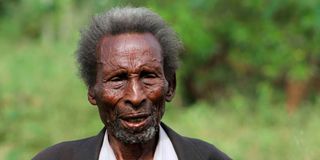
William Ngie, who has been diagnosed with liver and kidney diseases, during an interview with the Nation in Thange village, Makueni County, March 20, 2025.
In Thange village, Mzee Ngie Nguku, who has been diagnosed with kidney disease, showed the Nation.Africa team the grave of his son, Mutisya Ngie, who succumbed to liver and kidney failure last year.
A neighbour, Nyaha Muchoki, died in 2018 from what residents and family members say was the same liver and kidney failure that afflicted his neighbours.
In neighbouring Moki village, the Nation.Africa team visited the homestead of Monica Wambui, who succumbed to liver and kidney disease a week ago while receiving treatment at Kenyatta National Hospital.
She will be buried on Saturday March 22, 2025.
Her neighbour, Ndunge Mukiti, died of the same diseases last year, while Paul Kiusya, another neighbour, died a year ago while undergoing treatment.
In Ngomano village, Anna Mbalu, Beatrice Mbalu, Mwende Willy, Kanini Kotu, Kioko Kotu, Beatrice Kimeu, Mutiso Kyuma, Bernard Kaloki and Loise have all succumbed to liver and kidney diseases on different dates over the past two years, according to their relatives.
With no access to alternative water sources, Thange residents continue to draw water from the Thange River, especially after Nema gave the river a clean bill of health following months of cleaning by EnviroServ, a South African company contracted by KPC.
St Peters Boys Thange Secondary School, which has 200 students, has been drawing water from the river after the authorities condemned the school's borehole when it yielded water contaminated with oil.
The school uses a donkey-drawn cart to transport jerrycans of water from a section of the river that is considered clean.
"Access to water has become our biggest challenge in the last 10 years. We are forced to draw from the river after the authorities condemned our borehole following the Thange oil spill," said school principal Joseph Mutangili at a meeting attended by Governor Mutula Kilonzo Jr this week, where he appealed to sponsors for an alternative source of water.
“We are staring at a catastrophe,” Makueni Health Executive Paul Musila said as he confirmed the link between the wave of kidney and liver diseases sweeping across the Thange region and the pollution of water sources with oil.
A medical doctor by training, Musila said he had reviewed the medical records of the affected communities as he joined the renewed push for KPC to be held accountable and to clean up the environment.
“A section of the money KPC should ultimately offer as compensation should go toward enhancing the laboratory at Kibwezi Sub-County Hospital to boost response to the emerging effects of oil spillage,” he said on Tuesday, the day Makueni Governor Kilonzo Junior set up a task force to probe the impact of the oil spill on humans, livestock, soil, and water sources.
“We are not satisfied with the work KPC has done to clean up the Thange oil mess. Evidently, the river is still polluted. We want Nema to issue a restoration order so that KPC can clean the polluted river and environment while supporting affected communities with water and relief food,” Mr Kilonzo Jr said.
The governor unveiled the task force comprising county government officials from the agriculture, environment, health, and water departments, as well as community representatives.
He termed the unattended environmental degradation following the oil spill as a violation of the rights of the Thange community and revealed a plan to sue KPC in the Environment and Land Court over its handling of the crisis.
With the task force in place, Mr Kilonzo Jr has set the stage for a showdown with KPC, which has repeatedly downplayed the impact of the oil spill.
“KPC conducted an independent environmental impact assessment in collaboration with Panafcon Ltd. The findings, which were shared with the county government, Nema, and communities, also included results of a medical examination. The report, which is publicly available through Nema, concluded that no adverse effects on human health were identified that would necessitate further intervention,” said KPC Managing Director Joe Sang in a March 6, 2025, letter to Nema Director General Boru Mamo, who had sought an update on actions taken by KPC to resolve the crisis and ensure environmental restoration.
According to Mr Sang, the state corporation has disbursed Sh38,078,070 to 342 households in the Thange region as compensation for the oil spill.
The amount and targeting of compensation, he explained, were based on the environmental impact assessment and an evaluation by an insurance company contracted by KPC to handle the matter.
This is, however, a far cry from the Sh200 million the economic and social impact report had estimated as the required amount of compensation.

